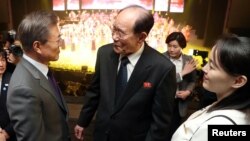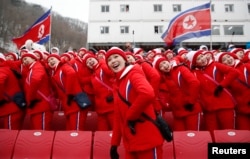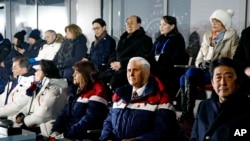South Korea’s Olympic outreach to North Korea has raised concerns that Seoul is willing to overlook human rights abuses to improve inter-Korean relations.
At the same time there are questions as to whether the recent U.S. focus on the repressive nature of the Kim Jong Un government is meant to justify increased sanctions or even military action to end the North Korean nuclear threat.
Downplaying atrocities
At the National Assembly in Seoul this week some opposition party members criticized South Korean President Moon Jae-in for not confronting Kim Yo Jong, the sister of Kim Jong Un, about ongoing human rights violations in North Korea, when he met with the North’s delegation to the Pyeongchang Winter Olympics being held in the South.
“North Koreans are also Korean citizens in our Constitution. As some of our citizens are suffering from severe human rights violations, we should show more interest and raise our voices to prevent this. But as the government is not doing so, I think it is abandoning its constitutional duty,” said Hong Il-pyo, who is a member of the National Assembly Human Rights Forum in Seoul.
In 2014 the United Nations General Assembly voted to recommend that the North Korean leadership be charged with crimes against humanity at the International Criminal Court, based on a Commission of Inquiry (COI) report that documented systematic, widespread and gross human rights violations committed by the government, including murder, enslavement, torture, imprisonment, rape and forced abortion.
According to his critics, Moon, a former human rights lawyer, has downplayed the ongoing atrocities in the North to pursue a nonconfrontational diplomacy approach, emphasizing increased dialogue and engagement, to reduce the potential for conflict with Pyongyang over its threatening nuclear development program.
Rights agenda
By facilitating the North’s Olympic participation, Moon has helped achieve a temporary pause in provocations. Since late November 2017, Pyongyang has not attempted any missile or nuclear tests. In the two years before, North Korea fired more than 25 missiles and conducted three nuclear tests, with the expressed goal of developing a nuclear-armed intercontinental ballistic missile that can target the U.S. mainland.
The country’s Olympic delegation, highlighted by Kim Jong Un’s sister and the more than 200 cheerleaders at the games, has helped present a more reasonable and engaging image of North Korea to the world. During her meeting with Moon, Kim conveyed an invitation for the South Korean president to soon visit Pyongyang for a leaders summit.
Human rights advocates commended Moon’s engagement efforts, but have called on the government in Seoul to more strongly advocate for the protection of basic freedoms and rights in North Korea.
“While it is good that there are talks, that people are talking to each other, a human rights approach must be part of the dialogue as well,” said Signe Poulsen, who represents the U.N. Office of the High Commissioner for Human Rights in Seoul.
The Moon administration insists that the human rights situation in North Korea is also part of its diplomatic outreach, but offered no details how it would address the issue.
“We are dealing with the North Korean human rights as the important issue for our national affairs. We are continuing the efforts to improve the human rights of North Koreans,” said Ministry of Unification spokesperson Baik Tae-hyun.
Some advocates for engagement have argued that the human rights situation in North Korea should be addressed after there is a peaceful resolution to nuclear threat and after normal diplomatic relations with Pyongyang have been established.
Inconsistent U.S.
The administration of U.S. President Donald Trump has tried to counter North Korea’s charm offensive in participating at the Olympics by focusing on human rights violations in the authoritarian state.
In his State of the Union Address in January, President Trump denounced the “depraved character of the North Korean regime.” He highlighted the struggles of North Korean defectors who escaped poverty and repression in the North, as well as the ordeal suffered by Otto Warmbier, a U.S. student who was kept in a North Korean prison, while in a coma, for nearly a year. He died soon after being released.
Vice President Mike Pence, who led the U.S. Olympic delegation invited along Warmbier’s father and also met with defectors to bring further attention to human rights violations committed by the Kim government.
Writing in the New York Times this week, Gary Bass, a professor of politics and international affairs at Princeton University, said Trump lacks consistency and credibility in standing up for human rights as he “has welcomed thugs from Egypt, Turkey and Vietnam to the White House” that have been accused of serious human rights violations, while disingenuously condemning North Korea “when he thinks it promotes United States strategic priorities.”
The Trump administration’s emphasis on North Korean repression has raised concerns that the U.S. may try to use human rights violations to justify future military intervention in North Korea. But it may more likely be part of the U.S. “maximum pressure” strategy to force Pyongyang to give up its nuclear program.
“I think it is just another element of their effort to put Kim Jong Un and his regime under as much economic and psychological pressure as possible,” said David Straub, a North Korea analyst with the Sejong Institute.
The U.S. inflexible approach at the Olympics, Straub said, also undercut South Korea’s outreach. Later Pence shifted the emphasis away from human rights and said Washington would be open to talks with Pyongyang but would keep up sanctions pressure until North Korea offered real concessions to end its nuclear program.
Lee Yoon-jee in Seoul, South Korea, contributed to this report.







